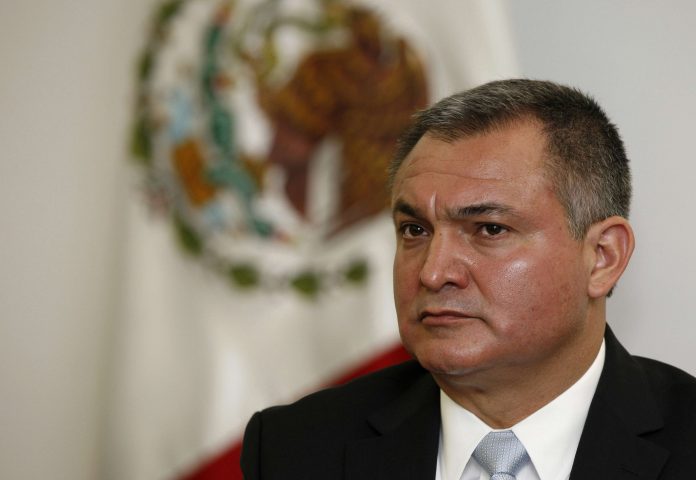
By JENNIFER PELTZ
Associated Press
NEW YORK (AP) — Describing meetings at a car wash and a smuggler’s country house, a onetime drug trafficker testified Monday that he paid a former cabinet-level Mexican security official millions of dollars for help that included U.S. government information about a huge cocaine shipment in Mexico.
Óscar Nava Valencia, known as “El Lobo,” said the payments to former security secretary Genaro García Luna also were intended to assure protection at a time when a schism in the notorious Sinaloa cartel was heading toward a drug-world war.
García Luna and a high-ranking police official “said they were going to stand with us,” Nava Valencia told jurors at García Luna’s U.S. federal drug trafficking trial.
García Luna is accused of accepting millions of dollars to let the Sinaloa cartel operate with impunity as it sent tons of cocaine to the U.S.
Defense lawyers haven’t yet had their chance to question Nava Valencia, but they have argued that the case rests on lies from self-interested criminals. García Luna has pleaded not guilty, and his lawyers have said the former cabinet member tried earnestly to combat the drug trade and is being abandoned by a U.S. government that once viewed him as a partner.
Nava Valencia — who is sometimes known as “El Lobo” Valencia and whose nickname means “the wolf” in Spanish — pleaded guilty years ago to cocaine conspiracy. He once helmed Mexico’s Milenio drug cartel.
That enterprise had ties to the Sinaloa cartel during the reign of infamous kingpin Joaquin “El Chapo” Guzman, whose recent U.S. trial aired testimony about alleged payoffs to García Luna.
Nava Valencia told jurors he paid $5 million to García Luna and other high-level government officials to try to free a shipping container packed with 10 tons (9,070 kg) of Colombian cocaine after it was seized in the Mexican Pacific Coast port of Manzanillo around 2007.
The traffickers didn’t get the drugs back; indeed, another 10-ton container was seized days later, and the drugs were incinerated, Nava Valencia said.
At a meeting about a month later in a cartel bigwig’s country house outside the central Mexican city of Cuernavaca, García Luna said he hadn’t been able to intervene because the U.S. government and Mexican marines had been involved in the seizure, Nava Valencia testified.
But he said García Luna came through in another way: He later provided a document showing that the U.S. government had known about the shipment and its origins, information that the Mexican traffickers used to persuade their irritated Colombian suppliers that the problem had been on the Colombians’ end. The Colombians then backed off their demand for a $50 million reimbursement, Nava Valencia said.
Nava Valencia recounted a second face-to-face meeting with García Luna some time later, amid a rift in the Sinaloa cartel. Nava Valencia ultimately aligned with Guzman’s faction, which worried that its allies-turned-adversaries would turn to informing authorities so as to get police to harass their rivals.
“There were going to be operations and investigations against us, and we wanted to try to put a brake on them,” he explained.
So, he said, he and his associates paid $500,000 to get a meeting with García Luna, and another $2.5 million when the then-security secretary showed up for the sit-down in an office above a car wash in the city of Guadalajara. That was when, according to Nava Valencia, García Luna and the police official with him pledged “to stand with us.”
García Luna led Mexico’s Federal Investigation Agency from 2001 to 2005, then served as secretary of public security to then-President Felipe Calderon from 2006 to 2012. He left Mexican government service and moved to Miami in 2012. He was arrested in 2019 in Texas and has since been held without bail in a federal lockup.
He could face decades in prison if convicted of drug trafficking and engaging in a continuing criminal enterprise.



















